- Home
- Michele Scott
Silent Harmony: A Vivienne Taylor Horse Lover's Mystery (Fairmont Riding Academy Book 1)
Silent Harmony: A Vivienne Taylor Horse Lover's Mystery (Fairmont Riding Academy Book 1) Read online
The characters and events portrayed in this book are fictitious. Any similarity to real persons, living or dead, is coincidental and not intended by the author.
Text copyright © 2013 Michele Scott
All rights reserved
No part of this publication may be reproduced, stored in a retrieval system, or transmitted, in any form or by any means, electronic, mechanical, photocopying, recording, or otherwise, without the prior permission of the copyright owner. Request for permission should be addressed to:
Amazon Publishing
Attn: Amazon Children’s Publishing
P.O. Box 400818
Las Vegas, NV 89140
www.amazon.com/amazonchildrenspublishing
Library of Congress Cataloging-in-Publication Data is available upon request.
ISBN-13: 9781477817131 (paperback)
ISBN-10: 1477817131 (paperback)
ISBN-13: 9781477867136 (eBook)
ISBN-10: B00BHIFQ3K (eBook)
Editor: Tim Ditlow
First edition
10 9 8 7 6 5 4 3 2 1
To my daughter Kaitlin.
You are a blessing, and watching you ride your Mr. Monty brings me more joy than you’ll ever know. You two were a huge inspiration for this series.
I love you.
CONTENTS
CHAPTER one
CHAPTER two
CHAPTER three
CHAPTER four
RILEY — CHAPTER five
CHAPTER six
CHAPTER seven
TRISTAN — CHAPTER eight
CHAPTER nine
CHAPTER ten
CHAPTER eleven
CHAPTER twelve
RILEY — CHAPTER thirteen
CHAPTER fourteen
TRISTAN — CHAPTER fifteen
CHAPTER sixteen
CHAPTER seventeen
TRISTAN — CHAPTER eighteen
CHAPTER nineteen
CHAPTER twenty
CHAPTER twenty-one
CHAPTER twenty-two
TRISTAN — CHAPTER twenty-three
RILEY — CHAPTER twenty-four
CHAPTER twenty-five
CHAPTER twenty-six
TRISTAN — CHAPTER twenty-seven
CHAPTER twenty-eight
RILEY — CHAPTER twenty-nine
CHAPTER thirty
CHAPTER thirty-one
CHAPTER thirty-two
CHAPTER thirty-three
TRISTAN — CHAPTER thirty-four
CHAPTER thirty-five
CHAPTER thirty-six
RILEY — CHAPTER thirty-seven
CHAPTER thirty-eight
CHAPTER thirty-nine
TRISTAN — CHAPTER forty
TRISTAN — CHAPTER forty-one
CHAPTER forty-two
CHAPTER forty-three
CHAPTER forty-four
RILEY — CHAPTER forty-five
CHAPTER forty-six
ACKNOWLEDGMENTS
ABOUT THE AUTHOR
CHAPTER one
I don’t like being afraid.
And if I look at it logically, I really shouldn’t be this scared. Except that I am moving fifteen hundred miles away from my family, my friends, and my horses. And, reminder to self—it’s all for a chance to achieve every goal and dream I’ve ever had.
That being the case, you’d think I’d be a little more excited and a little less totally messed up in the brain—like a swirly-twirl-of-colors-blending-until-I-get-dizzy kind of messed up. The kind of messed up that makes you feel like you want to puke. My mom says it’s “just nerves” and that it’s normal for me to feel this way. But, here’s the thing: my mom and I both know that I am so not normal. And if the kids at my new school—excuse me, at the Academy—find out how not normal I am, well, it likely wouldn’t be so good for me.
Here’s the thing: I’m not idiotic enough to think that I am going to walk into the Fairmont Riding Academy for Young Equestrians to a chorus of “Welcome, Vivienne Taylor! We are so thrilled that you’re here and can’t wait to become your lifelong friends.” Not by kids with horses that cost more than our house. Kids who drive expensive cars from Germany. Kids who think Target is something they shoot at while out on expensive weekend hunting vacations with their fathers, not a place where people can buy comforter sets that include sheets for under fifty bucks, cool T-shirts, and pretty-smelling candles.
And I have to face facts: I am different from them. My mom is a single parent who’s worked her butt off as a large-animal vet to support my brother and me and make sure that I’ve had the best three-day event training that we could possibly get within driving distance of our small Oregon town. She knows just how important my dream is to compete someday in the Olympics. Thus, the working off of her butt.
It’s been about a month since I received the letter from the Fairmont Academy letting me know that I had been chosen for their annual scholarship. My first three thoughts: Me? Me? Me! The only chance someone like me will ever have to attend Fairmont is through this scholarship.
So I do realize that I should be completely excited and way less stressed out about it. But tell that to my brain, and maybe, I have to admit, to my heart.
“Sweetie, wake up. I need your help.” It’s well past midnight, and Mom’s voice is tense as she stands in the doorway of my room. I know immediately what she needs. “I’m sorry about this, Vivvie.”
“No worries, Mom. I was awake. Just thinking about stuff.” I pick my jeans up off the floor and slip out of my pajama pants and into them. I look around for my Thomas Jefferson High sweatshirt. “Who’s gonna stay with Cole?”
“I’ve put Sadie and Georgia in your brother’s room. I wish Grandma were here, but two Rotties might actually be better protection. I’ll lock up and meet you in the truck. Thanks, Shnoopy,” she says, calling me her favorite pet name, which is somewhat embarrassing when said in front of my friends, but she’s my mom and, truth be told, I kinda like the nickname after all these years.
“What do we have?” I ask as I climb into the truck.
“A thirteen-year-old mare down in Albany. Owner went to bring her in from pasture for the night and noticed she was severely bloated and seemed to be having problems breathing.”
“Too many causes to choose from.” I zip up my sweatshirt and pull my hood on. It seems cold for a late August night, or maybe that’s just me. I always tend to be a bit chilly.
Mom glances at me through weary blue eyes as she punches in the address on the GPS. “That’s why I’m bringing you.”
I nod and reach into the backseat to scavenge for a Diet Pepsi among the vet reports, bandages, books, junk food, dog leashes, and dog toys. Professionally speaking, my mom can detail a report to clients like nobody’s business, but she tends to be less focused and orderly when it comes to this truck and our house. Way less focused. I try to pick up the slack on these things. “Want one?” I hold up the soda can.
“I was actually up working on some reports and had a couple of cups of coffee to keep me going. I just had a feeling about tonight. Why were you still awake?”
I shrug. “Don’t know. Just couldn’t sleep.” Because I’m secretly scared to death and can’t stop obsessing about leaving home. “What’s up with this woman just calling us now if her horse is this sick? I mean, wouldn’t she have brought her in from the pasture in the early part of the evening?”
“When I asked her what time she brought her in, she said it was only an hour ago.”
�
�And it’s one o’clock in the morning,” I say, noticing the clock on the dashboard.
“Something tells me she may have been out on a late night and just forgot about her horse.”
“Oh, she’s one of those.”
“Careful, Vivvie.”
We pull up to a small, worn-out house with a ramshackle barn in the back. There are three horses in one of the corrals, and a decent-size pasture. Mom pulls up next to the barn. Its dim light casts shadows on the hard-packed ground. I grab a flashlight.
“Hi, Ms. Harris. I’m Dr. Taylor. This is my daughter, Vivienne,” my mom says to a skinny, overly bleached blond woman. I take note of a deep sadness in the horse owner’s dark eyes, detectable even in this weak lighting.
“Oh, you can call me Rebecca. I got your number from my neighbor, Gary Ferguson, a few miles up the road. He says you’re the best. Thank you for coming out so late. You think she’s colicking?”
Colic tends to be the initial go-to guess for most backyard horse owners. It’s an easy assumption but not always correct. Horses have this delicate digestive tract, and when they get stomachaches, they can’t puke. Instead, they roll on the ground, seeking some kind of relief. But the scary thing is that when they roll, their intestines can twist, and that can kill them. Colic surgery is expensive, and if the condition isn’t caught early enough, the consequences are deadly.
“Has she been rolling?” Mom asks.
“No. Just been down,” the woman says, her voice all shaky and her eyes filling with tears. “You gotta help her.”
Mom touches her on the shoulder. “I’ll do whatever I can.”
The other three horses watch us, all of them sensing something bad. I face them for a few seconds and nod. I close my eyes briefly and take in a deep breath. My mother is a healer. We are here to help.
One of the horses—a little paint—bobs his head once and then lowers it to the ground. In the shadow of the light I notice him pawing the ground for several seconds. Then he begins to lick and chew on his mouth, an act of submission. He understands me. He knows what I’ve told him.
I see the mare on the ground, frothing at the mouth. This isn’t good. Rabies? Her belly is completely distended, and there’s a familiar rotten-sweet smell in the stall. Diarrhea.
My mother kneels near her head and strokes her face. “It’s okay, mare.”
“What’s her name?” I ask Rebecca.
“Summer.”
Mom places her stethoscope over the area of Summer’s heart. “Vivvie, come here. See what you get from this.”
Mom moves to the mare’s rear end to take her temperature. A few seconds later she says, “One hundred and four. Could mean an infection. Or maybe a virus?” Mom sucks in a deep breath and eyeballs me.
Think. It’s a high temp for an adult horse. They’re usually about the same as us—between ninety-eight and ninety-nine degrees.
I quickly kneel down next to Summer, who, though in obvious agony, lifts her head slightly as I place my hand on her face. Her weak groan echoes off the steel walls of the stall. “It’s not colic.” I glance at my mother.
“Piroplasmosis? Tularemia?” Mom suggests, referring to awful tick-induced diseases. “Her pulse is so thready.”
I rub my hands over the horse’s entire body, searching for the disgusting parasites. “No. I don’t think so. No ticks.” Then I slide one hand under Summer’s face, and place the other on the opposite side of her cheek. “Hi, sweet girl. Hi. Can you help us help you? I know you hurt. I know.”
Everything grows silent and still in the stall. Even the dust particles floating in the haze of the light stop swirling. Summer’s eyes are fluttering. Suddenly, I feel a deep shudder travel through her, kicking up a plume of dust underneath her legs.
Water. Bad.
“Is she gonna die?” Rebecca squeals. “What’s happening?”
My mother quickly kneels down next to me. “It’s the pasture,” I tell her. “Cowbane—it’s in the water.”
“Oh my God,” Mom says. She turns and looks at Rebecca. “How much grass do you have in your pasture?”
Rebecca twists her hands nervously. “I’m not sure. It’s been a bit dry.”
Summer is convulsing again. This time as I scan her body, I notice the deep crevice in her hindquarters. I stand up and shine my flashlight on the other horses. All are severely underweight.
I hear Mom ask, “What about water? Is there water out in the pasture?”
“There’s a ditch that fills up when we get showers here. It’s just, I haven’t had the money to put good seed down for some time.”
“And we haven’t had a good shower for a couple of weeks,” I say. “I’m guessing you haven’t provided clean water for these animals all summer.” As the heat rises in my cheeks I have to bite my lip not to say more. Same old story, seen way too many times—another client who has no business owning horses.
“Hey, there’s enough feed out there. And we, we—we have gotten some rain. Hell, it mists here every morning.” Rebecca straightens her shoulders as she says this; her deeply lined face stretches taut.
I stare at this idiot as my mother breezes past me, headed to the truck. “Let’s just keep focused, Vivvie,” she whispers.
“There’s poison in that pasture,” I continue. “It’s coming from the source you think is a decent watering hole. Your horse here is probably going to die because of it. My mom will have to treat all your animals who either drank or ate it. And just so you know, no horse will eat cowbane unless they’re starving.”
Rebecca’s jaw drops. “I didn’t know. I really didn’t know.”
“Oh, I believe you. But you should have.”
Mom brings back two IV bags and an IV setup.
“Sodium nitrate and thiosulfate?” I ask.
She nods grimly. “Please go to the truck and get me some electrolytes, Banamine, and carbamazepine.”
I run to the truck and slide open one of the drawers that holds these meds.
Summer doesn’t fight Mom as she gets the IVs started. Next, Mom injects her with Banamine. We have to get her fever down fast. The injection of carbamazepine is to stop the seizures. I stay kneeling at Summer’s head, talking to her, stroking the small white star she has on her forehead. “You like green apples best, don’t you?” I keep petting her as Mom begins pumping in the other meds. “How about little kids? You like little kids?”
The mare closes her eyes as another shudder racks her body. “I know a little girl who would love to meet you. Her name is Kimmy. I babysit her sometimes. She’s seven and very sweet. They have a pony named Ziggy, but they would love a pretty girl like you. Kimmy would feed you green apples every day.”
Tired.
I feel Summer’s body relaxing.
Sick.
I sigh. “I know. Don’t worry. We won’t make you stay here. There are greener pastures.”
Mom gives me a sharp look and shakes her head.
Friends.
I glance at Mom before whispering into Summer’s ear. “Your friends? We can help them too. But it’s your choice, girl. Your choice. You don’t have to stay here.”
We pump more meds and electrolytes into her over the next hour. Mom places a call to the emergency hospital and asks for a trailer to be brought out. Summer is shaky on her legs, but we are able to get her loaded onto the trailer when it arrives.
“Who’s gonna pay for this?” Rebecca hollers. “I don’t have money for a fancy vet hospital. If I knew you was gonna call them, I’d have put her down.”
“I’ll pay,” Mom says. “I will pay her medical bills.”
I glance at her with a sharp look. She shrugs.
“Okay,” Rebecca replies meekly.
“But understand, this means that Summer is now my horse. And I’m going to treat your other three. And I’m sorry, but they will need to be removed from your property.”
“I never mistreat my animals,” Rebecca sobs.
“Neglect is just as bad.”
After closing the trailer door and letting the driver know that she’ll be at the hospital as soon as she takes care of the other three horses, Mom turns and faces Rebecca full-on. “Rebecca, it’s simple, really. Can you properly take care of these animals right here and now?” she asks. “Can you afford them? Is it fair to them to leave them out in a pasture at all hours without any real feed and expose them to contaminated food and water? Do you think it matters to them that you didn’t know about it?”
Rebecca stares hard at her. “Guess not,” she mutters.
“Okay then. I think we all know what needs to happen.”
I help treat the other horses. Each shows symptoms of toxicity. And we still don’t know whether any will survive. The next several hours will be crucial.
When we finish up three hours later, Rebecca has gone back into her house. When Mom told her that someone would be out by 9:00 a.m. to pick up the remaining horses, she didn’t say one word.
Yeah, what can you say? I think.
It is heartbreaking and horrible. And way, way too common.
Back in the truck, Mom glances up at me as she finishes writing down her notes. “I know.”
“No, you don’t.”
“Uh-huh, I sure do,” she says.
“Come on, Mom. It’s just, I worry about you. How are you supposed to pay for Summer’s care at the vet hospital, and who is going to take in those other three horses? Mom?”
She cocks an eyebrow. “I make a decent living.”
“That’s not—”
“I’ll work a few extra hours.”
“I know you will! But you need a life. And with me going away, you’ll only have Cole.”
“And Grandma.”
“Fabulous. A seven-year-old and a seventy-year-old. I want you to, I don’t know, go out with your friends once in a while. All you do is work.”
She takes my hand. “Shnoopy, this is my life. You, your brother, and these animals. And once I fatten those four up, by the time you come home at Christmas, I guarantee all four will be with responsible, loving new owners.”
I sigh, lean back, close my eyes. I want to argue with her, but here’s the thing: I would do the exact same thing. Not the sensible thing, the practical thing, or the easy thing. But for us, it’s the only thing.

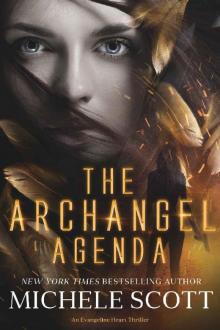 The Archangel Agenda: An Evangeline Heart Thriller
The Archangel Agenda: An Evangeline Heart Thriller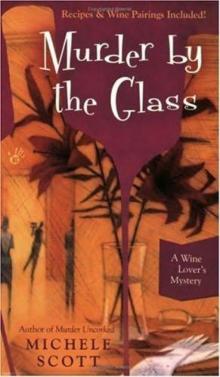 Murder By the Glass
Murder By the Glass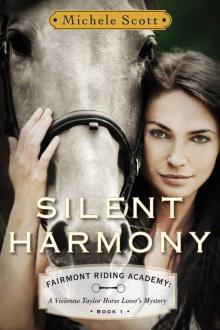 Silent Harmony: A Vivienne Taylor Horse Lover's Mystery (Fairmont Riding Academy Book 1)
Silent Harmony: A Vivienne Taylor Horse Lover's Mystery (Fairmont Riding Academy Book 1)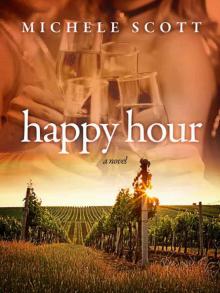 Happy Hour
Happy Hour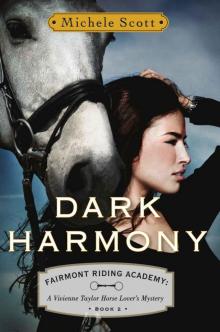 Dark Harmony: A Vivienne Taylor Horse Lover's Mystery (Fairmont Riding Academy Book 2)
Dark Harmony: A Vivienne Taylor Horse Lover's Mystery (Fairmont Riding Academy Book 2)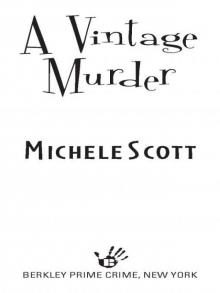 A Vintage Murder
A Vintage Murder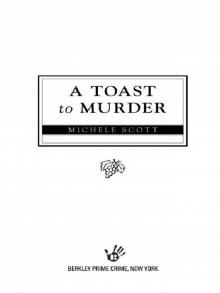 A Toast to Murder
A Toast to Murder A Killer Margarita (Nikki Sands'/Wine Lover's Mystery Series)
A Killer Margarita (Nikki Sands'/Wine Lover's Mystery Series)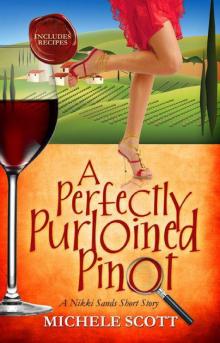 A Perfectly Purloined Pinot (Nikki Sands' Mysteries)
A Perfectly Purloined Pinot (Nikki Sands' Mysteries)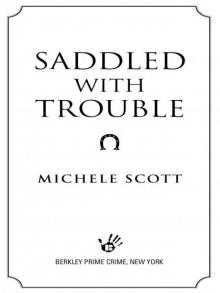 Saddled with Trouble
Saddled with Trouble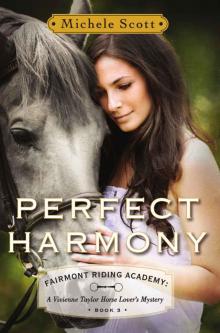 Perfect Harmony: A Vivienne Taylor Horse Lover's Mystery (Fairmont Riding Academy Book 3)
Perfect Harmony: A Vivienne Taylor Horse Lover's Mystery (Fairmont Riding Academy Book 3)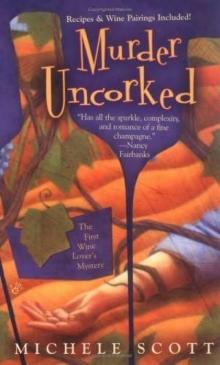 Murder Uncorked
Murder Uncorked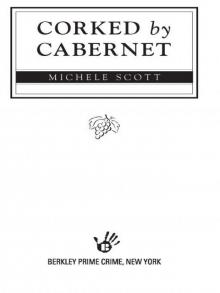 Corked by Cabernet
Corked by Cabernet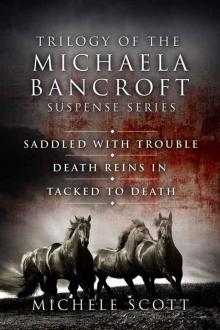 The Michaela Bancroft Mysteries 1-3
The Michaela Bancroft Mysteries 1-3 Dog Gone Dog
Dog Gone Dog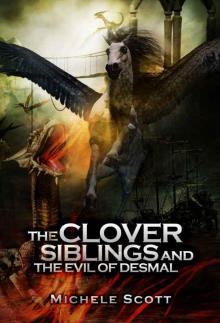 The Clover Siblings and the Evil of Desmal
The Clover Siblings and the Evil of Desmal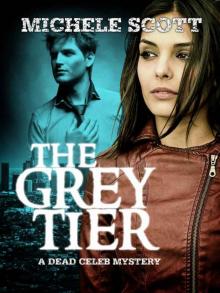 The Grey Tier
The Grey Tier